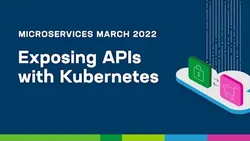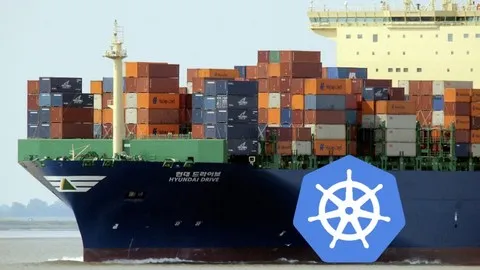
Exposing APIs with Kubernetes (North-South Traffic) 
This course covers the fundamentals of Kubernetes Networking, including how to expose APIs with Kubernetes, the different types of Ingress Controllers, and how to install NGINX with a Kubernetes Cluster. Participants will also learn how to troubleshoot deployment issues and fix web server issues. A demo will be included to demonstrate the concepts. ▼
ADVERTISEMENT
Course Feature
![]() Cost:
Cost:
Free
![]() Provider:
Provider:
Youtube
![]() Certificate:
Certificate:
Paid Certification
![]() Language:
Language:
English
![]() Start Date:
Start Date:
On-Demand
Course Overview
❗The content presented here is sourced directly from Youtube platform. For comprehensive course details, including enrollment information, simply click on the 'Go to class' link on our website.
Updated in [February 21st, 2023]
Unlock the Exciting World of Learning! Here's What Awaits You: With this online course, learners can gain a comprehensive understanding of Kubernetes Networking and how to expose APIs with Kubernetes. Learners will learn how to install NGINX with a Kubernetes Cluster, how to troubleshoot deployment issues, and why they should use multiple NGINX Ingress Controllers. Through two demos, learners will gain hands-on experience in setting up and managing Kubernetes Networking. The course will also provide a recap of key points and links and resources for further learning. Finally, learners will have the opportunity to ask questions and register for Microservices March 2022.
[Applications]
After taking this course, participants should be able to apply the knowledge they have gained to expose APIs with Kubernetes. They should be able to install NGINX with a Kubernetes Cluster, identify and fix deployment issues, and understand why it is beneficial to use multiple NGINX Ingress Controllers. Additionally, they should be able to use the resources and links provided to further their understanding of Kubernetes Networking.
[Career Paths]
1. Kubernetes Network Engineer: Kubernetes Network Engineers are responsible for designing, deploying, and managing Kubernetes clusters and networks. They must be knowledgeable in the latest Kubernetes technologies and trends, and be able to troubleshoot and resolve any issues that arise. The demand for Kubernetes Network Engineers is growing rapidly as more organizations move to cloud-native architectures.
2. Kubernetes Developer: Kubernetes Developers are responsible for developing applications and services that run on Kubernetes clusters. They must be knowledgeable in the latest Kubernetes technologies and trends, and be able to troubleshoot and resolve any issues that arise. The demand for Kubernetes Developers is growing rapidly as more organizations move to cloud-native architectures.
3. Kubernetes Security Engineer: Kubernetes Security Engineers are responsible for designing, deploying, and managing secure Kubernetes clusters and networks. They must be knowledgeable in the latest Kubernetes technologies and trends, and be able to troubleshoot and resolve any security issues that arise. The demand for Kubernetes Security Engineers is growing rapidly as more organizations move to cloud-native architectures.
4. Kubernetes DevOps Engineer: Kubernetes DevOps Engineers are responsible for designing, deploying, and managing Kubernetes clusters and networks. They must be knowledgeable in the latest Kubernetes technologies and trends, and be able to troubleshoot and resolve any issues that arise. The demand for Kubernetes DevOps Engineers is growing rapidly as more organizations move to cloud-native architectures.
[Education Paths]
1. Bachelor of Science in Computer Science: This degree path focuses on the fundamentals of computer science, such as programming, software engineering, and computer architecture. It also covers topics such as artificial intelligence, machine learning, and data science. With the increasing demand for technology professionals, this degree path is becoming more popular and is expected to continue to grow in the coming years.
2. Master of Science in Information Technology: This degree path focuses on the application of technology to solve business problems. It covers topics such as software development, database management, network security, and cloud computing. This degree path is becoming increasingly popular as businesses are looking for professionals who can help them leverage technology to improve their operations.
3. Master of Science in Cybersecurity: This degree path focuses on the security of computer systems and networks. It covers topics such as cryptography, network security, and digital forensics. With the increasing number of cyber threats, this degree path is becoming more popular and is expected to continue to grow in the coming years.
4. Master of Science in Data Science: This degree path focuses on the analysis of large datasets to uncover insights and trends. It covers topics such as machine learning, data mining, and predictive analytics. With the increasing demand for data-driven decision making, this degree path is becoming more popular and is expected to continue to grow in the coming years.
Course Provider

Provider Youtube's Stats at AZClass
Discussion and Reviews
0.0 (Based on 0 reviews)
Explore Similar Online Courses

How to Use QuickBooks Desktop 2023 for Beginners - 1+ Hour QuickBooks Tutorial!

DAVINCI RESOLVE 18 for BEGINNERS - 2023 Guide Everything You NEED to KNOW to get STARTED

Python for Informatics: Exploring Information

Social Network Analysis

Introduction to Systematic Review and Meta-Analysis

The Analytics Edge

DCO042 - Python For Informatics

Causal Diagrams: Draw Your Assumptions Before Your Conclusions

Whole genome sequencing of bacterial genomes - tools and applications

Kubernetes for Beginners (Kubernetes + Docker)

Scalable Microservices with Kubernetes


Start your review of Exposing APIs with Kubernetes (North-South Traffic)